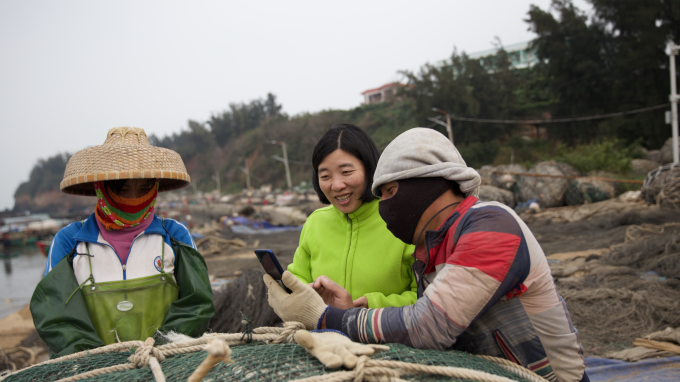
Photo courtesy of China Blue Sustainability Institute.

Photo courtesy of China Blue Sustainability Institute.
The last review of the China program took place in 2018. Since then, various global and domestic developments have had major implications for the RBF’s grantmaking in China.
In 2020, China announced its domestic goals to peak carbon emissions before 2030 and reach carbon neutrality by 2060. Today, China is the world’s largest renewable energy producer and investor and will likely reach its target of 1,200 GW of installed clean energy capacity by 2025—five years ahead of schedule. China also leads the world in production of clean energy technologies, electric vehicles (EVs), batteries, and transition minerals.
Between 2012 and 2022, China enacted 31 environmental laws and over a hundred administrative regulations at the national level and over 1,000 rules and measures at subnational levels. The successful expansion of China’s regulatory capacity for environmental and climate concerns illustrates how concerted and sustained investment in institutional infrastructure can help a country usher in a more sustainable and healthy future for its people. Chinese NGOs, universities, and public institutions have all played essential roles in advancing this progress, and RBF support has allowed many such organizations to experiment with new interventions.
If leveraged effectively, China’s experiences scaling up clean energy systems could help inform and accelerate other countries’ energy transitions. However, the COVID-19 pandemic and the Russia-Ukraine war highlighted the tenuous nature of international cooperation on global challenges, including public health, energy, and trade. A sharp deterioration in U.S.-China relations also marked this period. The contentious dynamics between the world’s largest emitters create an ever more challenging environment for addressing climate change.
China’s role in global sustainable development and climate action is indispensable, given the size of its domestic economy, its robust trade linkages with emerging economies, and its increasingly proactive role in international fora. Its Belt and Road Initiative (BRI), launched in 2013, has come to encompass a range of large-scale development projects, including significant investments in energy and transportation infrastructure, in dozens of countries across the Global South.
RBF support has helped China’s environmental and climate field lay the foundations for greater regional and international engagement between China and the Global South. Our grantees in China are now leveraging their established relationships and accumulated experience to collaborate with partners in Vietnam, Indonesia, and Brazil, helping to define how global civil society actors could partner to bring about more effective change in global sustainable development.
In light of these changes and upon review of the program’s current portfolio, the China program has updated its grantmaking guidelines. The program will retire its strategy focused on indigenous philanthropy because that work has been incorporated into other existing strategies. It will also add a new strategy to build the capacity of Chinese partners in support of China’s constructive role in global climate and environmental governance.